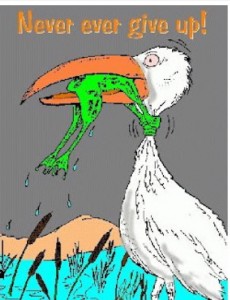Archive for month: January, 2015
weeping
/in bewustwording, Gevoelens /by Henny BosTranen hebben iets heiligs.
Ze zijn geen teken van zwakte
maar van kracht.
Ze zijn boodschappers van
groot verdriet en
van onuitsprekelijke liefde
Washington Irving
performance anxiety
/in bewustwording /by Henny BosLao tse
/in bewustwording /by Henny BosOver de waarde van onze fouten – deel 3
/in bewustwording /by Henny BosWhen you see the imperfection in the other, first think of your own imperfection and continue on your way from transformation to self-realization, doing yourself and your environment a favor.
Von Dürckheim writes: "The three basic errors of man that Buddhism always emphasizes: onwetendheid, desire and hate are therefore only consequences of attachment.
I have looked up a number of statements about mistakes for you, among others: "A mistake that humbles a man is better for him than a good deed that makes him vain" and "The greatest mistake is to be unaware of any mistake" and "In the relationship of man to man, confession of error is always something that brings you closer 'and' Anyone who acknowledges a mistake proves that he has become a bit more sensible today than he was yesterday 'and' Anyone who feels stepped on when a mistake is brought to his attention lacks the qualities to move forward and "There is hope for those who know their mistakes, no hope for those who don't want to admit it ". Confucius zei: "Do you see a good person trying to emulate him, do you see a bad person look for your faults in yourself ".
Learning from your own mistakes is smart, but learning from others' mistakes is even smarter. You do not have to pay the tuition fee. Because of the other person's mistakes, which we usually have a good view of, we come to the awareness of our own mistakes, which we usually don't have a good view of. We see the splinter in the eye of the other person and not the beam in our own eye, says the Bible.
The environment can serve as a mirror for ourselves. Do not blame the other person for his mistakes, but rather thank him for drawing your attention to his own mistakes, allowing you to progress.
Thomas à Kempis writes: "Because you fear contempt, you do not want to be corrected for mistakes, and you seek a shadow of apology.". We often blame the other person for pointing out our mistakes, while we should be thankful for it. The other person who points out our mistakes dares to take the risk of a conflict with you and will certainly care about you and wants the best for you.
A complaint is free advice that we should take to heart. I think it's a big mistake just to be looking for confirmation, erkenning, appreciation and compliments. All those things only lock you in so that you remain who you are and not grow, you don't develop. And everything was not growing is dead.
A true friend is willing to point out your mistakes, which you can take advantage. A true friend is willing to enter into a possible conflict with you because you don't leave him indifferent. You don't easily point out a stranger to his mistakes, you just walk on. Most customers don't complain, they just walk away…Cayce writes: "Get the profit out of your mistakes: impatience can indicate idealism, fretful nature on passion, disorganization can indicate spontaneity ". I know someone who is very chaotic, but the advantage of this is that she is also very creative and resourceful..
I was also very impatient, everything had to be done quickly and therefore awareness could not attach itself to the experience. I was annoyed with people who were slow and tried to push them up instead of leaving them in their value…I was the norm, the world revolved around me, I was so self-centered and convinced that I was doing well, so no reason for self-observation and change to discover how it really was. I was not so concerned with truth and lived in an illusion with the image that life was finite and so a lot had to be done quickly.
There was a must behind it was unfree, I was edgy and uptight and screamed at myself. After the crisis, I was very interested in books about NDE Near-Death Experiences, because I felt I had been dead myself. Goethe gods: "Stirb und werde" and I understood that now. I also became very interested in philosophy, psychology and esotericism and read hundreds of books and had conversations about it with Loes, Gerrit, If, Johan, Elly and Leon.
———————-
Contactgegevens
Burg. de Bruijnstraat 35
7006 AT Doetinchem
E: hennybos@xs4all.nl
T: 0314 – 34 38 21
M: 06 – 10421646
Skype: hennybos123
Links:
clear Vision
Topconsulenten
Recent Posts
Producten
-
 Anderenwaarde, over codependentie
€21,50
Anderenwaarde, over codependentie
€21,50
-
 De dramadriehoek
€27,00
De dramadriehoek
€27,00
-
 Betekenisvol leven
Rated 5.00 out of 5€24,50
Betekenisvol leven
Rated 5.00 out of 5€24,50 -
 If criticism hurts
€14,95
If criticism hurts
€14,95



